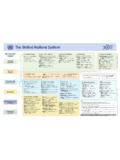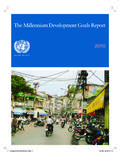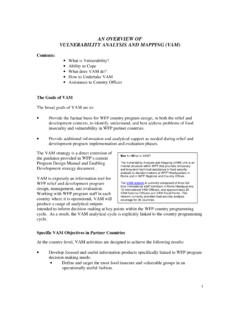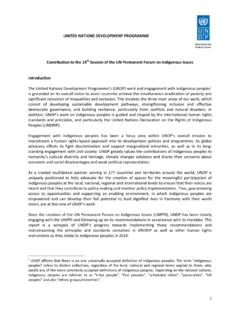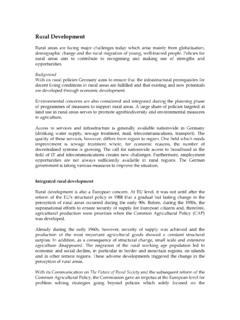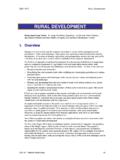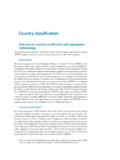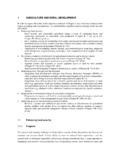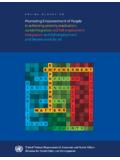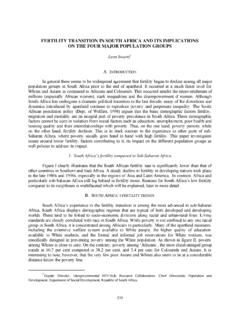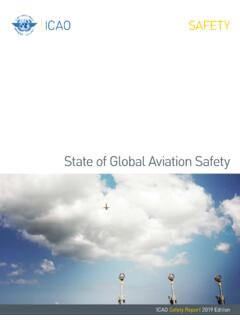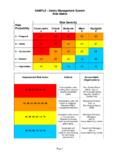Transcription of UNSMS Security Policy Manual
1 UNSMS Security Policy Manual UNSMS Security Policy Manual UNITED NATIONS Security management SYSTEM Security Policy Manual CONTENTS1 Chapter I Foreword /Introduction Chapter II United Nations Security management System ( UNSMS ) of of Reference of the Executive Group on of Reference of the Inter-Agency Security management with Host Countries on Security of the Department of Safety and Lives Together Chapter III Applicability of UN Security management System of United Nations Security management SystemChapter IV Security management Security Planning on Security Risk management * Security , Evacuation and Alternate Work Modalities-Measures to Avoid of United Nations Protection of Force Private Security of Security Private Security Security - Sensitivity, Classification and Handling Security Mitigation Measures 1 The chapters in blue are the policies which are in effect.
2 The items in black are chapters yet to be developed. The blank chapters are no longer in existence. *These are items supported by guidelinesUNSMS Security Policy Manual Considerations in Security management * Operating Security Standards (MOSS) Security Measures (RSMs) Q. Crisis management and ResponseManagement of Security -Related Incidents and Incident management * Action Reports, Lessons Learned and Best Explosive Devices (IEDs) Chapter V Compliance with Security Policies and Procedures Clearance Policy and the Travel Request Information Process (TRIP) and Security Incident Reporting System Training and and Evaluation Monitoring G. Boards of Inquiry Policy - BOIC hapter VI Administrative and Logistic Support for Security Operations A. Remuneration Of United Nations System Staff and Eligible FamilyMembers on Relocation/Evacuation StatusG. management of Stress and Critical Incidents Stress (MSCIS)Chapter VII Provisions on Safety Matters Safety UNSMS Security Policy Manual Date: 04 February 2011 Technical Review: 1 May 2017 UNITED NATIONS Security management SYSTEM Framework of Accountability for the United Nations Security management System.
3 UNITED NATIONS Security management SYSTEM Security Policy Manual Chapter II22222 SECTION B UNSMS Security Policy Manual Chapter II: UNITED NATIONS Security management SYSTEM B. Framework of Accountability 2 of 257 I. Scope 1. The primary responsibility for the Security and protection of personnel employed by United Nations system organizations, their spouses and other recognized dependants and property and the organizations property rests with the host Government. This responsibility flows from every Government s normal and inherent function of maintaining order and protecting persons and property within its jurisdiction. In the case of international organizations and their officials, the Government is considered to have a special responsibility under the Charter of the United Nations or the Government s agreements with individual organizations.
4 2. Without prejudice to the above and while not abrogating the responsibility of the host Government for its obligations, the United Nations has a duty as an employer to reinforce and, where necessary, supplement the capacities of host Governments to fulfil their obligations in circumstances where United Nations personnel are working in areas that are subject to conditions of insecurity which require mitigation measures beyond those which the host Government can reasonably be expected to provide. This Framework of Accountability specifies the responsibilities and accountabilities of United Nations officials and personnel for such measures. 3. In this regard, the United Nations Security management System ( UNSMS ), in seeking to establish and maintain operations in insecure and unstable environments, adopts the principle of how to stay as opposed to when to leave as a tenet of its Security management approach.
5 4. In accepting responsibility and accountability for Security management , it is recognized that fatalities and/or casualties may occur, even though appropriate efforts are being made and measures implemented to reduce to an acceptable level the risks to United Nations personnel, premises and assets. II. Mission Statement of the United Nations Security management System 5. The goal of the UNSMS is to enable the conduct of United Nations activities while ensuring the safety, Security and well-being of personnel and the Security of United Nations premises and assets. 6. To achieve this goal, all organizations shall maintain a robust and cohesive Security management system and adhere to three principles: Determination of acceptable risk Provision of adequate and sustainable resources to manage the risk to personnel and their eligible dependants, premises and assets; and Development and implementation of Security policies and Security Policy Manual Chapter II: UNITED NATIONS Security management SYSTEM B.
6 Framework of Accountability 3 of 257 III. Governance Mechanism 7. The governance of Security management for the UNSMS as a whole is constituted as follows: a) The Inter-Agency Security management Network (IASMN), consisting of the senior managers who have oversight of Security functions within each member organization of the UNSMS , reviews existing and proposed policies, procedures and practices of the UNSMS and their implementation, and it provides recommendations on these to the High-Level Committee on management (HLCM); and b) A comprehensive review of policies and resource-related issues pertaining to the entire UNSMS is a standing item on the agenda of the HLCM. The HLCM reviews the recommendations made by the IASMN and either decides on them directly or recommends their endorsement and implementation to the United Nations System Chief Executives Board for Coordination (CEB), which is chaired by the Secretary-General.
7 IV. Actors within the United Nations Security management System A. The Secretary-General 8. Under Article 97 of the Charter of the United Nations, the Secretary-General is the chief administrative officer of the Organization. The mandates promulgated by the principal organs are entrusted to him for their implementation under Article 98. The Secretary-General is thus accountable to the Member States for the proper running and administration of the Organization and implementation of its programmes, to include, in the context of this framework, the overall safety and Security of United Nations personnel, premises and assets at headquarters and field locations. The Secretary-General can delegate authority to the various Under-Secretaries-General who are individually accountable to him. B. The Under-Secretary-General for Safety and Security 9.
8 The Under-Secretary-General for Safety and Security is appointed in writing by the Secretary-General to whom he/she reports and is accountable to. The Secretary-General delegates to the Under-Secretary-General for Safety and Security the authority to make executive decisions relevant to the direction and control of the UNSMS and the overall safety and Security of United Nations personnel, premises and assets at both field and headquarters locations. The Under-Secretary-General for Safety and Security represents the Secretary-General on all Security -related matters and serves as the Chairman of the IASMN. The responsibilities of the Under-Secretary-General for Safety and Security include: (a) Developing Security policies, practices and procedures for the United Nations system worldwide. (b) Coordinating with the organizations of the United Nations system to ensure the implementation of, the compliance with and the support for Security aspects of their activities.
9 (c) Preparing reports of the Secretary-General on all Security -related matters. UNSMS Security Policy Manual Chapter II: UNITED NATIONS Security management SYSTEM B. Framework of Accountability 4 of 257 (d) Advising the Secretary-General on all matters related to Security and safety of the United Nations system. C. The Executive Group on Security 10. The members of the Executive Group on Security (EGS) are appointed by the CEB. When requested by the Under-Secretary-General for Safety and Security , the members of the EGS advise, reinforce and facilitate the rapid decision-making authority and accountability of the Under-Secretary-General for Safety and Security , in accordance with the EGS Terms of Reference.
10 The members of the EGS have a responsibility to support the Under-Secretary-General in the discharge of his/her mandate related to the safety and Security of all personnel employed by the organizations of the United Nations system and their recognized dependants, premises and assets. D. Executive Heads of United Nations System Organizations2 11. Executive Heads of the United Nations Agencies, Funds and Programmes (AFP) are responsible and accountable to the Secretary-General for ensuring that the goal of the UNSMS is met within their respective organizations. Without prejudice to their accountability to their own governing and legislative bodies, Executive Heads of the United Nations specialized agencies, and of other organizations participating in the UNSMS , recognize the coordinating role and authority of the Secretary-General in matters related to the safety and Security of United Nations personnel and commit themselves to ensuring that the goal of the UNSMS is met.
